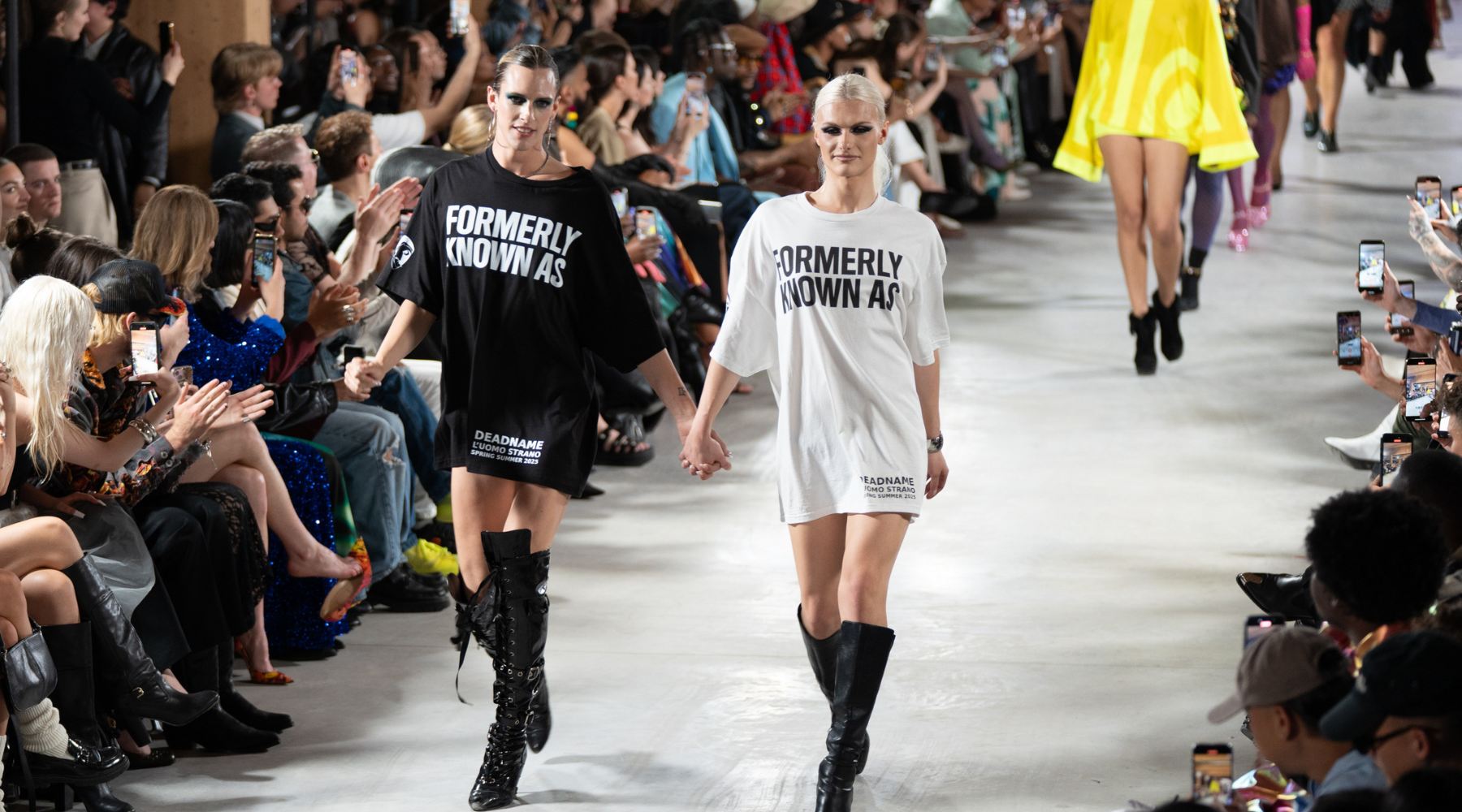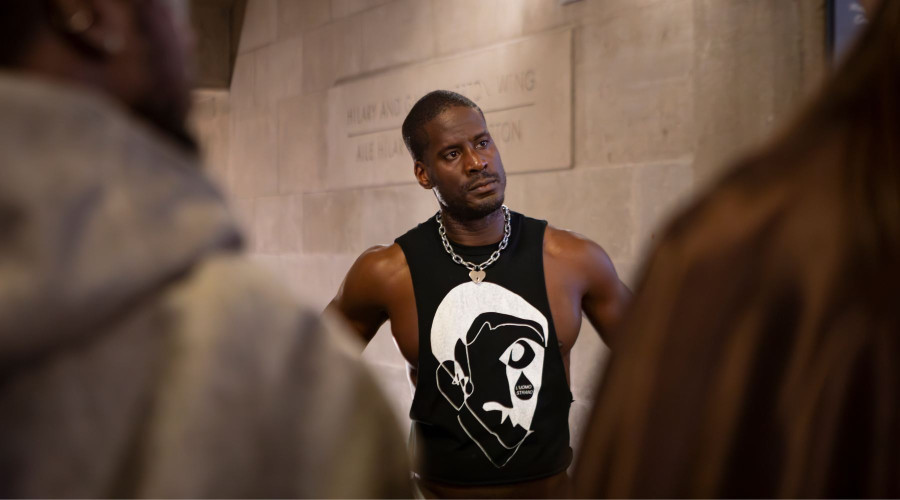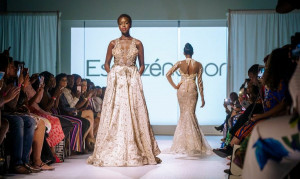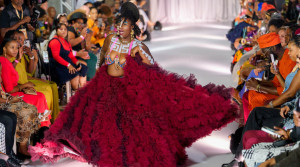The pair opened Mic. Carter’s show at the Fashion Art Toronto's 20th anniversary event with a kiss on the runway, and running off stage to thunderous applause. The moment sparked tears, conversations, and radical visibility.
For the shirt’s designer Mic. Carter, this wasn't just fashion. It was protest, joy, and survival wrapped in $50 t-shirts.
"Fashion for me is inherently political," Carter says. "As a Black, non-binary person, the way I show up in the world is political. That's the ethos of L'Uomo Strano."
Building Space Where There Was None
Fifteen years ago, Carter couldn't find what he was looking for: clothing that celebrated femme-presenting bodies, Black bodies, and the expansive beauty of existing beyond binaries. Shopping felt joyless. So he created the alternative.
"The potential and power of fashion is the space of joy and the power of collectivity," Carter explains. "I really wanted to start something that would invite a community to participate in self-actualizing beauty and self-love."
After studying at George Brown and Central Saint Martins in the UK, Carter discovered European nightlife and gay liberation that transformed his vision. He returned to Toronto to teach fashion, launch L'Uomo Strano, and build community through design.
His first Fashion Art Toronto collection, "Objet Petit A", aimed to feature exclusively Black and non-binary models—a network that didn't yet exist. Now, opening with the "Formerly Known As" shirts feels full circle.
A Last-Minute Act of Defiance
The shirts were born from rage. As anti-trans legislation surged, Carter watched the policing of trans bodies and erasure of trans existence. He woke up that morning and decided: today.
"The power of 'Formerly Known As' really speaks to the power of self-actualization and the gender expansiveness that is attached to the changing of a name," he says.
The design draws from the MET Gala's celebration of dandyism and a book documenting drag balls—once hotspots for everyone, not just the queer community. One shirt features newspaper clippings celebrating these balls. The other showcases Vanity, Prince's protégé who redefined herself repeatedly, name changes and all.
Carter got the shirts printed that morning. They arrived at the venue an hour before showtime.

Models Jade Haley and Amelia Jesseau had just finished another show when they asked Carter if he needed walkers. He showed them the shirts, almost apologetic that they weren't more elaborate.
Haley, who is Haudenosaunee and has walked nearly 10 shows for L'Uomo Strano since 2017, immediately understood the assignment.
"I felt so honoured to wear it," Haley recalls. She turned to Jesseau: "Girl, this needs to be a statement. We could actually do something with this."
They choreographed the kiss. Found out they were opening the show. Locked in their poses and that iconic run off stage.
"I felt the shock and awe when we did it," Haley says. "I felt the audience react, and I felt a flame be ignited. It was probably my best runway moment. People came up to us afterwards, crying. It was really special."
Why Representation Hits Different at L'Uomo Strano
Haley describes Carter's aesthetic as afro-futurism that makes whoever wears it feel regal. But the real magic is deeper.
"The brand has always been clothing that could be worn by anybody, which is really important," Haley explains. "A lot of the time we're put into boxes. Even applying for modelling jobs, you have to say you're a trans woman, and then they put you in boxes. But Mic has always worked with me as a designer and checked on me to see how I feel about things. If a model's not feeling a certain garment because of the gender it's making them feel they have to identify as, Mic is so quick to pivot."
Mars Alexander, a non-binary model, stylist, and performance artist with Trinidadian and Jamaican roots, has collaborated with Carter for years. For Alexander, the "Formerly Known As" shirts represent the power to transition, affirm identity, and express it safely—luxuries not everyone has.
"Trans and coloured people face obstacles in the world that no other kind of people face, especially if they're trans, Black, and disabled," Alexander says. "There's your skin colour being compared for a job based on if you look professional enough. There's the sound of your voice and wondering if you'll sound womanly enough on the phone. These are all barriers to achieving our financial goals and surviving day to day."
Proceeds With Purpose
The shirts retail for $50, with proceeds supporting the Okra Project, a US-based organization providing food, shelter, and programs to Black trans people.
"I really am inspired by their mission statement," Carter says. "Within the conversation of protecting the dolls, if we extrapolate a little bit more and focus on not just protecting the dolls, but hiring them, caring for them, centering them—I feel like the Okra Project does a really good job with that."
Though the organization is US-based, Carter pushes back against assumptions that Canada is easier for trans, queer, Black, or diverse people.
"On the one hand, it's so incredible. I love being Black, I love being queer, and I love being non-binary. There's such a rich history, our ancestors are so powerful and resilient," he says. "But sometimes I don't wanna be resilient. When Charlie Kirk was killed, everybody tried to connect it to trans people. I really had a hard time sleeping because I was thinking, if any connection is made to trans people, there are going to be murders of trans women south of the border—which does not negate the fact that Black and brown trans women are being murdered at higher rates than anybody. It's this experience of panic and fear and rumination where you want to hold your sisters close."
Alexander echoes the urgency: "There is so much bias against trans people. We need more charities and financial opportunities for people like us to really live our loudest, most authentic life and help inspire others, especially in the climate we're in."
Fashion as Freedom Work
Until government catches up and organizations like the Okra Project expand globally, Carter will keep crafting safe spaces through L'Uomo Strano—one collection, one model, one "Formerly Known As" shirt at a time.
Because when you're Black, non-binary, and navigating a world that wants to legislate your existence out of reality, fashion isn't frivolous.
It's survival. It's resistance. It's joy reclaimed.
It's inherently political.

 By
By 





